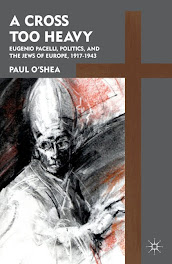Volume
and Document Number: 1.51 William Godfrey, Ap Del UK to Luigi Maglione, Sec
State.
Reference:
Report 95/29 (AES 3462/39)
Location
and date: London, 25.05.1939
Summary
statement: Details of a pilgrimage to Walsingham and prayers for peace. The Archbishop of Canterbury states that the
Pope could not call a Conference but could order prayers for peace.
Language:
Italian
Text:
I
hasten to send to your Eminence some details regarding the participation of
Great Britain in the crusade of prayers for peace called by the Holy Father.
(1)
According
to the instructions received from your Eminence this Apostolic Delegation wrote
to all Bishops and Superiors of Religious Orders to call all the faithful to
prayers according to the Holy Father’s wish.
The Bishops explained with noble words the initiative of the Pope who,
as Representative of the Prince of Peace, has no other wish than that peace
should reign amongst the nations.
In all churches during this beautiful month of May great multitudes have gathered
around the altars to invoke the gift of peace.
The children, especially, have take a prominent place in the prayers as
the Bishops have told them that the Pope trusted more in them than in men’s
ability.
Pilgrimage
to Walsingham.
The
volume of prayers for peace rose to its greatest height with the pilgrimage on
Sunday (2) to Our Lady of Walsingham.
This
is the most famous sanctuary in England dedicated to the glory of Mary, Mother
of God, it symbolises, one can say, the history of the Church. Built with the fervent piety of past
generations, the kings of England vied with their humblest subjects to increase
its splendour, and its fame spread over all Europe. The fury of the Reformation diminished but
did not extinguish the flame. After
regaining its freedom, the Church re-established the Walsingham Sanctuary, and
there, near the ruins of its past splendour the cult of Mary sprang to new
life. Now more than forty thousand
pilgrims a year visit the shrine.
Interpreting
the Holy Father’s intentions, the Catholic newspaper Catholic Herald launched the idea of a national pilgrimage. Last Sunday the small town of Walsingham was
invaded by thousands of pilgrims brought there by all means of transport from
all over the kingdom.
An
enormous procession was formed and proceeded, chanting hymns to the glory of
Mary, to the Slipper Chapel, two kilometres outside the town.
The
Rev. Scott James, who explained with impassioned words the significance of that
national gathering at Mary’s feet to invoke peace, brought the Holy Father’s
benediction to the pilgrims. The
pilgrims prayer for a long tine in the sanctuary and the Eucharistic
benediction closed a manifestation which will remain memorable.
Statement
of the Archbishop of Canterbury.
In
the Upper House (of the Convocation of Canterbury) yesterday, the Archbishop of
Canterbury made a few statements regarding the call to prayers. (3)
He
repeated the difficulties, which arise when a common action of the Christian
Churches is promoted. Regarding the
Pope’s proposal for a Christian Conference to be held he said: “It would not be
courteous or useful to invite the Pope to call such a conference, when one is
sure that it would be impossible for him to accept.” He concluded buy saying that the only ground
upon which it was possible to obtain unity was that of prayer, the importance
of which he exalted.
A
discordant note was introduced buy the Bishop of Birmingham, Dr Barnes (4), who
again voiced the usual criticism of the Holy See’s attitude during the
Ethiopian and Spanish wars, and during the occupation of Albania. He ended by protesting even against the use
of the title of “His Holiness” in addressing the Pope. (5)
The
Archbishop of Canterbury, with great good sense, reacted against his Birmingham
colleague, although adding that a difference must be made between prayer and
politics.
All
of this I have felt it my duty to communicate to your Eminence.
Notes:
(1)
See ADSS 1.15.
(2)
Sunday 21.05.1939. Walsingham was the
premier English Marian pilgrimage site prior to the destruction of the
sanctuary during the 1530s. Pilgrimages
were restored in 1897. See also The Tablet, 27.05.1939, p28. This was last major pilgrimage before the
war. Walsingham lay in a restricted zone
during the war years. American servicemen
organised the first Catholic Mass since the Reformation in the grounds of the
former Augustinian Priory on 17,05,1945.
(3)
William Cosmo Lang (1864-1945), Anglican Archbishop of Canterbury 1929-42. The Archbishop’s statement was enclosed. It was a cutting from The Times of 24.05.1939 “Dangerous Drift. Primate on tension in
Europe.”
(4)
Ernest Barnes (1874-1953), Anglican bishop of Birmingham 1924-53.
(5)
Cuttings from The Daily Telegraph and
Morning Post, Monday 25.05.1939,
contained a report of the speech of the Bishop of Birmingham in the Upper House
of the Convocation of Canterbury. The
bishop criticised Pius XI and Pius XII for not having protested against the war
Ethiopia and against the attack in Albania.
The Bishop also criticised the title of His Holiness used by the
Archbishop of Canterbury: “No man is holy although some men may be gracious”.




No comments:
Post a Comment
You are welcome to post a comment. Please be respectful and address the issues, not the person. Comments are subject to moderation.